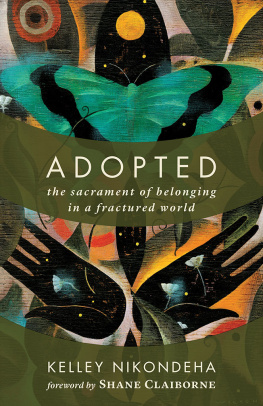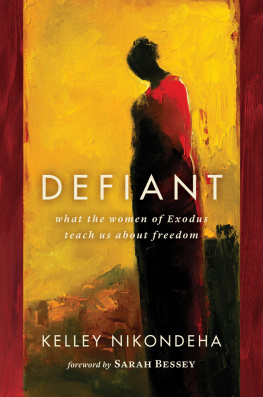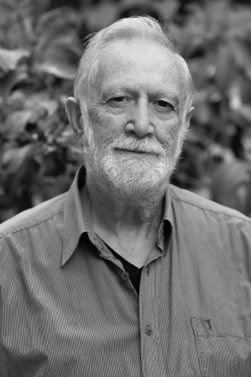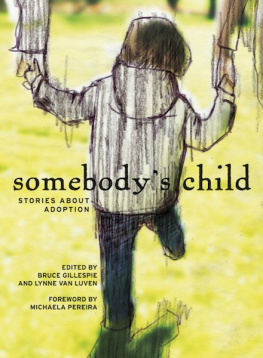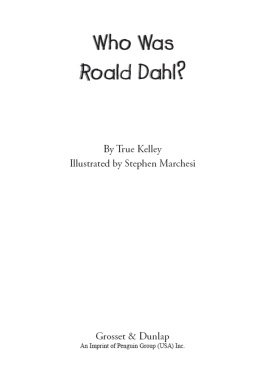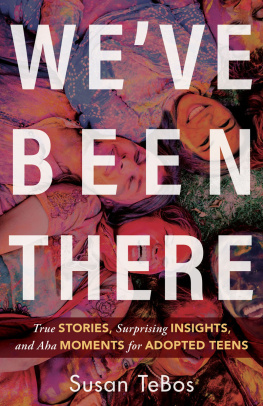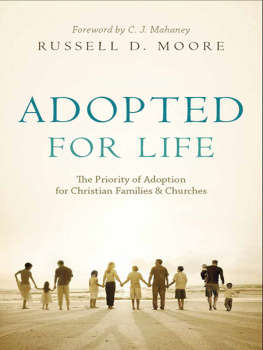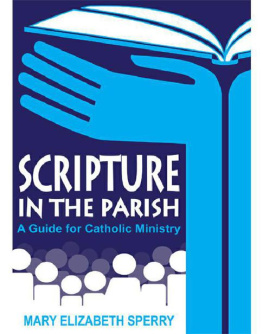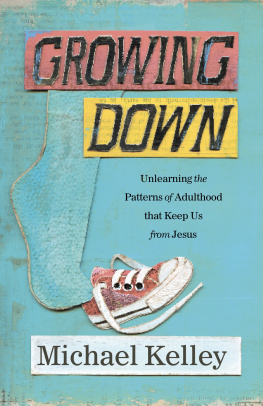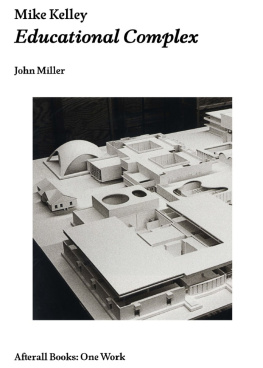ADOPTED
The Sacrament of Belonging
in a Fractured World
KELLEY NIKONDEHA
WILLIAM B. EERDMANS PUBLISHING COMPANY
GRAND RAPIDS, MICHIGAN
Kelley Nikondeha is my favorite kind of theologiana hybrid of poet and prophet, both mystical and yet very much planted in our world. This book is a radical look at belonging, and it will change all of us who are looking for ways to expand our tables.
D. L. MAYFIELD
author of Assimilate or Go Home:
Notes from a Failed Missionary on
Rediscovering Faith
Nikondeha effortlessly interweaves her lived experiences of adoption with provocative biblical stories and a daring theological imagination. So good!
DREW G. I. HART
author of Trouble Ive Seen:
Changing the Way the Church
Views Racism
As an orphan, daughter, and adoptive mother, Kelley brings a depth of experience and clarity of pen to this work of lived theology. If youre looking to adopt a holistic theology of orphan care, grab this book.
SETH HAINES
author of Coming Clean:
A Story of Faith
Through the metaphor of adoption, Kelley Nikondeha calls us to a vision of family that is generous, inclusive, and always ready to add another chair. This is the vision of the family of God I long for.
IDELETTE MCVICKER
founder and editor-in-chief of
SheLovesmagazine.com
I am so thankful for this work from the brilliant mind of Kelley Nikondeha. Theologically rich yet entirely accessible, her Adopted will surely become a favorite among church leaders and laypeople alike. Its easily one of my favorite books of the year.
NISH WEISETH
author of Speak: How Your Story
Can Change the World
Wm. B. Eerdmans Publishing Co.
2140 Oak Industrial Drive NE, Grand Rapids, Michigan 49505
www.eerdmans.com
2017 Kelley Nikondeha
All rights reserved
Published 2017
26 25 24 23 22 21 20 19 18 171 2 3 4 5 6 7 8 9 10
ISBN 978-0-8028-7425-2
eISBN 978-1-4674-4877-2
Library of Congress Cataloging-in-Publication Data
Names: Nikondeha, Kelley, 1969 author.
Title: Adopted : the sacrament of belonging in a fractured world / Kelley Nikondeha.
Description: Grand Rapids : Eerdmans Publishing Co., 2017. | Includes bibliographical references.
Identifiers: LCCN 2017008848 | ISBN 9780802874252 (pbk. : alk. paper)
Subjects: LCSH: Adoption (Theology) | Belonging (Social psychology)
Classification: LCC BT165 .N48 2017 | DDC 204/.41dc23
LC record available at https://lccn.loc.gov/2017008848
For the company of the adopted,
the relinquished and the redeemed.
This is our sacrament.
We sip from the chalice daily.
We imbibe Gods grace with each taste.
May our sacrament and our struggle
be a gift to a world hungry for belonging.
Contents
M other Teresa once said that the circle we draw around family is too small. We put limits on love. Because our vision isnt as big as Gods, we can end up spiritually short-sighted.
We reduce family to biology or nationality or ethnicity. We put up picket fences and build walls along our borders. We use the language of us and them, and we draw lines in the sand.
Kelley Nikondeha is the perfect person to set us free from our myopia and tunnel vision. She helps open our eyes to the boundless love of God. This book is about belonging. It is about the limitless hospitality of God, which has the power to transform us into people who extend the same hospitality to others.
Kelley was adopted at birth, something that has deepened her sense of what it is to be chosen. That also means her love is big, and the circle she draws around family is wide. Shes the adoptive mother of two kids from Burundi, a constant reminder that God specializes in the supra-natural as much as the natural.
As I read this book, I was reminded of the words of author and priest Henri Nouwen in With Open Hands:
Across all barriers of land and language, wealth and poverty, knowledge and ignorance, we are one, created from the same dust, subject to the same laws, and destined for the same end. With this compassion you can say, In the face of the oppressed I recognize my own face, and in the hands of the oppressors I recognize my own hands. Their flesh is my flesh, their blood is my blood, their pain is my pain, their smile is my smile.
Throughout these pages, Kelley fleshes out what it means to belong to each other and to the God who made us. She takes readers on a tour through Scripture, beginning with a baby in dangerMoseswhose desperate mother floated him down a river only to find him rescued and adopted by Pharaohs daughter. And thats just the beginning. All through Scripture, Kelley traces the thread of adoption and belonging.
Its a beautiful bookfor people who are thinking of building a family together, and for people who are looking for family. It shows that the relentless love of God cannot be contained. It doesnt stop at borders, or walls, or picket fences.
At the heart of the Christian faith is the idea that we are to be born again, as Jesus said to Nicodemus in the Gospel of John. To be born again means we have a new definition of family. As Jesus says, What is born of the flesh is flesh, and what is born of the Spirit is spirit. No longer is family limited to DNA.
And it was Jesus who, when told his mother and brothers were outside, spoke these words: Who is my mother, and who are my brothers? (Matt. 12:48-50). Whoever does the will of Godthey are family to him, and to us. Hes not disrespecting his familyhes just challenging the narrow vision that might be constricting our definitions of who belongs. Our circles around family might just be too small.
One of the things that Mother Teresa taught the world, and embodied so brilliantly, is the broad definition of family. When I worked with her and the sisters in Calcutta, I saw it firsthand. She rescued orphans abandoned in train stations and took in teenage moms. I even met grown men who had been raised by her. One of them explained to me that this is how she got her name. He went on to tell me stories from his childhood and show me things she had given him, just like a kid talking about his mom. She was Mom before she was Mother Teresa. She made the circle around family much bigger.
Kelley writes about that same wide circle. Her words expand our vision and deepen our sense of how loved by God we truly are. And she dares us to demonstrate that same generous love to the world we live in, a world desperately in need of loveripped apart by war, hatred, famine, and disease, its people suffering under the residue of slavery and racism, its families torn asunder by poverty and injustice.
And in the face of all this, there is hope. That hope springs from the sacrament of adoption, which Kelley calls a sacrament of resistance. The belonging that she describes allows us to rest in the confidence that we are beloved. It pushes back against all that divides the world. In Kelleys words, Adoption is one way we dare to stitch the world back together.
This book has the power to enlarge the circle around our familiesor, better yet, to erase the circle altogether, so that our vision of family is as wide and as expansive as Gods.
SHANE CLAIBORNE
I n an unphotographed moment, I entered the church. Soon after my birth, the good women of Holy Family Adoption Agency in Los Angeles made sure I was baptized. A priest sprinkled holy water on my forehead, and the church embraced me. I slipped into Gods family almost unnoticed. This was my first adoption.
A few weeks later, a woman scooped me out of the white-wicker bassinet in the viewing room of the adoption agency and claimed me as her own. Her physical emptiness prepared the way for my fullness; now I was twice adopted. By the time we left the building, with her cradling me in the crook of her arm, I belonged. Thats how sacraments tend to workaltering reality in an instant.

